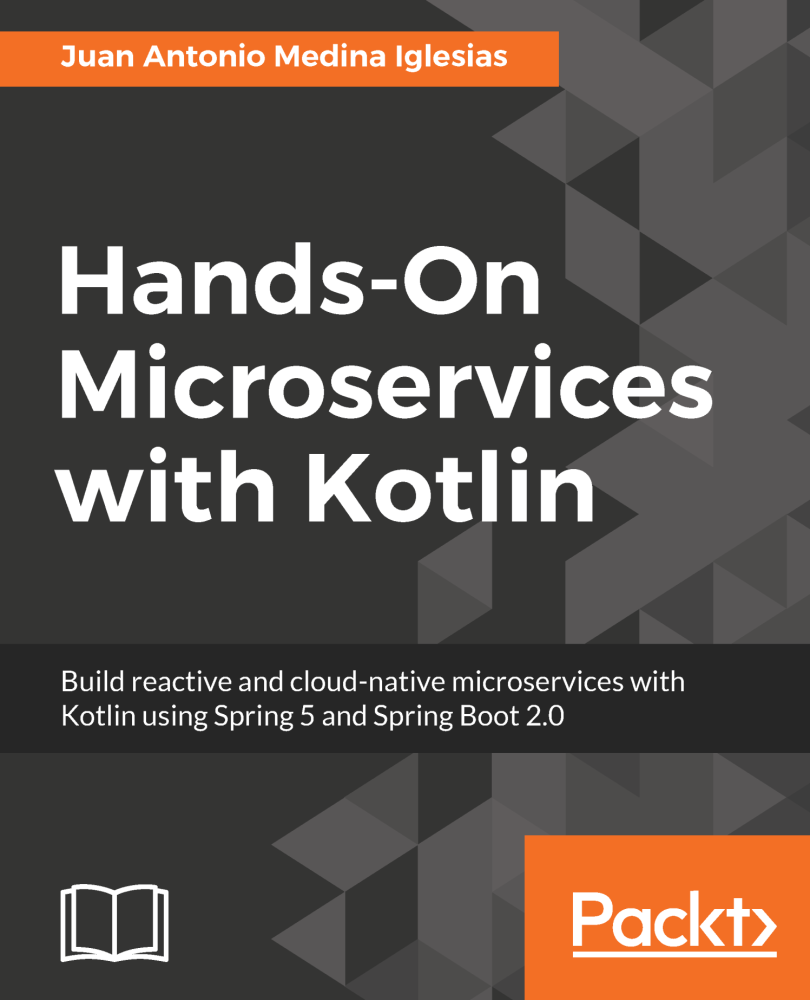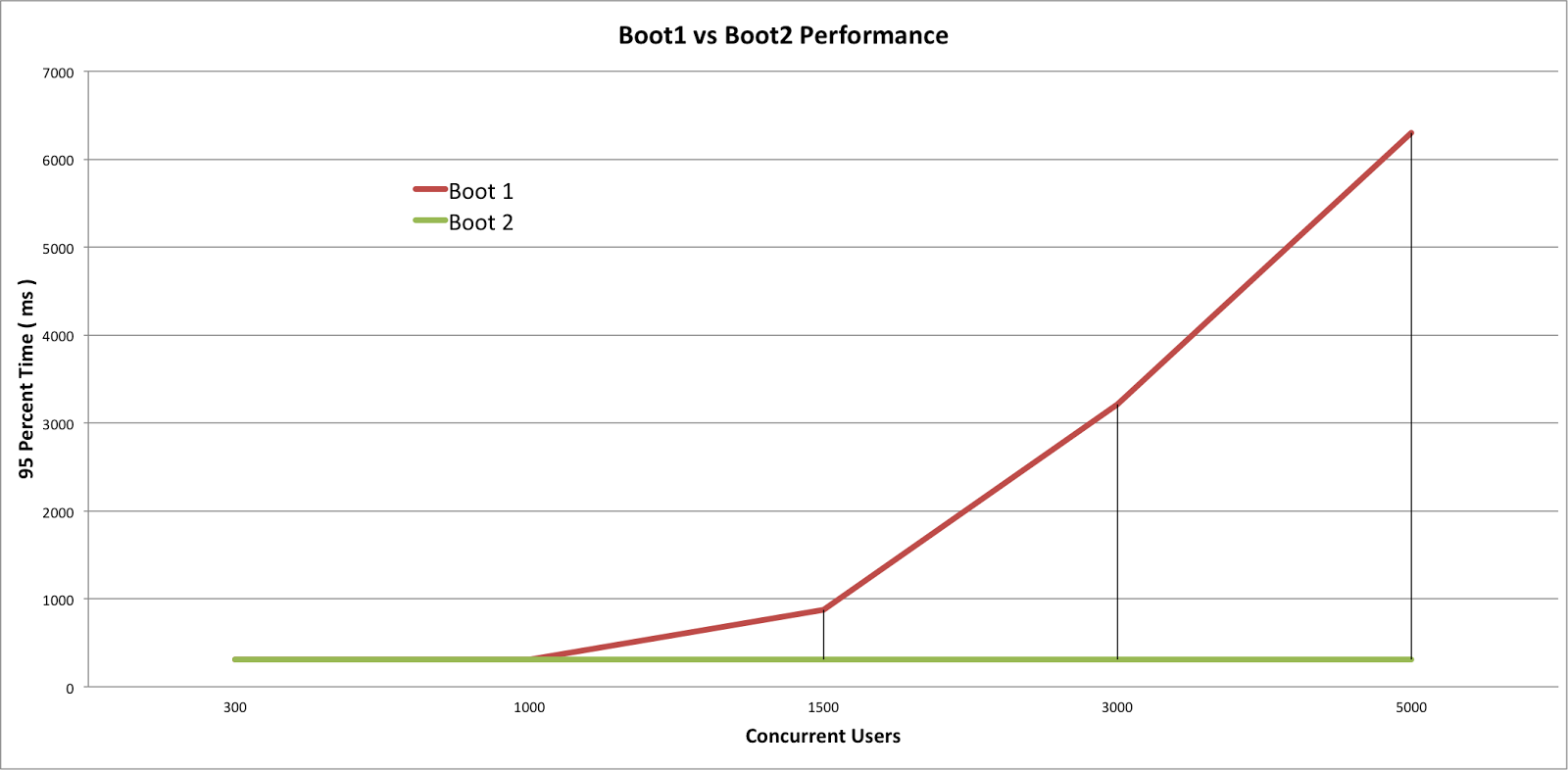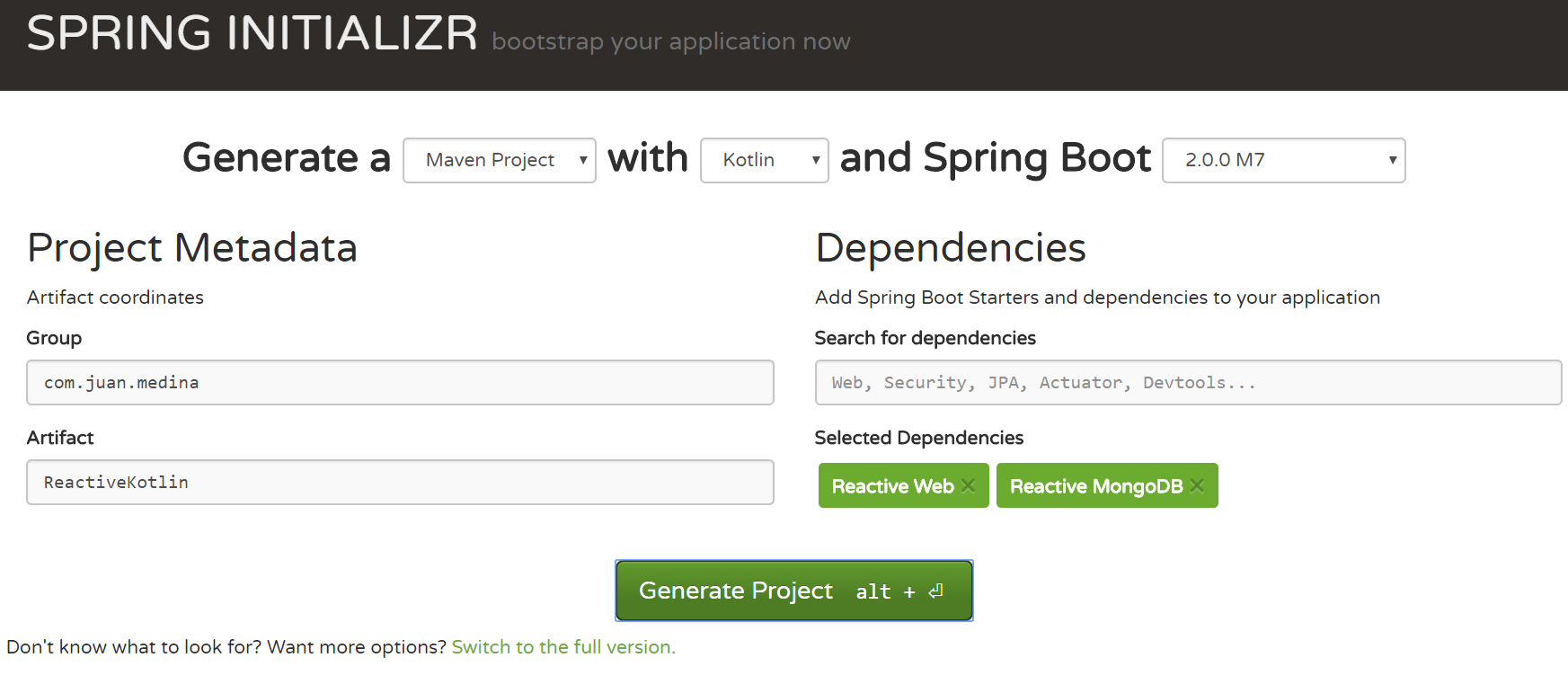Reactive Microservices in Kotlin
With Spring Framework 5 and Spring Boot 2.0Juan Antonio Medina Iglesias
Hello, I'm Juan Medina
a software engineer that just released a book about creating Microservices in KotlinI've been coding since I was 10
when I learned BASIC and Z80 AssemblerThree years ago I was a manager
that was only coding on my own personal timeI was disconnected from technology
except Excel, PowerPoint and WordTransformation was happening
and I was not readyResearch time
Forums, Github, twitter, Stackoverflow, YouTubeConversations
Yammer, Slack, Tech talks, Conferences & a lot of coffeeOpportunity
solutioning and innovationBuilding
a cloud native applicationUpgrading coding skills
refreshing and learning technologiesLearning by Example
https://github.com/LearningByExampleBlog and Articles
https://juan-medina.comKotlin mainstream language
- Google's support for Kotlin in Android
- Spring Framework 5 Kotlin extensions
- Reactor Kotlin extensions
- Spark Kotlin support
Learning Kotlin
Microservices, Reactive, Native, ServerlessPackt Publishing want a book
about Microservices in Kotlin
Writing a book
is a life changing experience
There is never enough feedback
at least until you get more feedbackFinally the book is done done
or did I mean done done done?
https://www.packtpub.com/web-development/microservices-kotlin
What I have learned
If you really want it, you can do it.
Why a book about Kotlin?
What is Kotlin
- A programming language
- Created by JetBrains
- Strong Typed
- C++/Java looks-like
- Concise
- Not a paradigm shift
- Modern constructs
- LLVM compiler
Can produce code for
- JVM
- JavaScript
- Native
- applications
- imports/export C libraries
- WebAssembly
- Cross platform modules
What it looks like
fun main(args : Array<String>) {
println("Hello, world!")
}Kotlin provides several features
let's review some of themNull Safety
var a: String = "abc"
a = null // compilation error
var b: String? = "abc"
b = null // ok
val l = b?.length ?: -1Object Oriented
class Greeter(val name: String) {
fun greet() {
println("Hello, $name")
}
}
fun main(args: Array<String>) {
Greeter(args[0]).greet()
}Type inference
val a = "abc"
val b = 1
fun getData() : String {
return "hello world"
}
val c = getData()
print(c) // will print "hello world"
fun getData() : Customer {
return Customer(1, "super customer") //a class that have id, name
}
print(c) // will print "Customer(id=1, name=super customer)"Single expression functions
fun sum(a : Int, b : Int) : Int = a + b
fun sum2(a : Int, b : Int) = a + b
fun bigger(a : Int, b : Int) = if (a>b) a else b
val value = if (bigger(x, y)==x) z else 1-z
val other = when(getValue(x, y)){
0, 1 -> 0
-1 -> y
else -> x
}Default and named arguments
fun displayBorder(character: Char = '=', length: Int = 15) {
for (i in 1..length) {
print(character)
}
println("")
}
fun main(args : Array<String>) {
displayBorder() //print: ===============
displayBorder('*') //print: ***************
displayBorder('*', 5) //print: *****
displayBorder(length = 2) //print: ==
}Data classes
// - equals() / hashCode()
// - toString() of the form "User(name=John, age=42)"
// - copy()
// - componentN() : component1() = name, component2() = age
data class User(val name: String = "", val age: Int = 0)
val user = User("John", "42")
val olderUser = user.copy(age=50);
val name, age = user;
fun getUser() = User("John", "42")
val userName, userAge = getUser()Extensions functions
fun MutableList<Int>.swap(index1: Int, index2: Int) {
val tmp = this[index1] // 'this' corresponds to the list
this[index1] = this[index2]
this[index2] = tmp
}
val l = mutableListOf(1, 2, 3)
l.swap(0, 2) // the list will be (3, 2, 1)Lambdas
val strings = listOf("hello", "I'm", "a list", "of", "strings")
strings.filter {
value : String -> value.length > 3
}.forEach{ value : String -> println(value) }
strings.filter{
value -> value.length > 3
}.forEach{ value -> println(value) }
strings.filter { it.length > 3 }.forEach(::println)Type-Safe builders
fun result(args: Array<String>) =
house {
rooms {
room {
person {+"Lonley"}
}
room {
person {
for (arg in args)
+arg
}
}
}They are dozen more features
for more details visit: https://kotlinlang.org/Kotlin vs Java
https://juan-medina.com/2017/06/04/reactive-kotlin-vs-java/Comparing two identical projects:
- Java: https://github.com/LearningByExample/reactive-ms-example
- Kotlin: https://github.com/LearningByExample/KotlinReactiveMS
| Lines of Code | Source | Tests |
|---|---|---|
| Java | 1004 | 1172 |
| Kotlin | 721 | 1017 |
| Complexity | Max |
|---|---|
| Java | 45 |
| Kotlin | 8 |
Mono<SunriseSunset> createResult(final Mono<GeoTimesResponse> geoTimesResponseMono) {
return geoTimesResponseMono.flatMap(geoTimesResponse -> {
if ((geoTimesResponse.getStatus() != null) && (geoTimesResponse.getStatus()
.equals(STATUS_OK))) {
return Mono.just(new SunriseSunset(geoTimesResponse.getResults().getSunrise(),
geoTimesResponse.getResults().getSunset()));
} else {
return Mono.error(new GetSunriseSunsetException(SUNRISE_RESULT_NOT_OK));
}
});
} open internal fun createResult(geoTimesResponseMono: Mono<GeoTimesResponse>) =
geoTimesResponseMono.flatMap {
with(it){
if (status == STATUS_OK) with(results) { SunriseSunset(sunrise, sunset).toMono() }
else GetSunriseSunsetException(SUNRISE_RESULT_NOT_OK).toMono()
}
}Kotlin is not only about shortening our code, is about reducing the boilerplate, making our code more comprehensible and easier to maintain
And as a bonus we can take our code to other platforms
Reactive Revolution
And these are just the most populars
Reactive Manifesto
https://www.reactivemanifesto.org/We believe that a coherent approach to systems architecture is needed, and we believe that all necessary aspects are already recognised individually: we want systems that are Responsive, Resilient, Elastic and Message Driven. We call these Reactive Systems.
What is a reactive system
A system that process asynchronously a stream of data with non-blocking back pressure.non-reactive system
| CLIENT | SERVER | DATABASE | ||
- The client waits until everything is completed
- No more requests can be handle in this thread
- This is a blocking operation
reactive system
| CLIENT | SERVER | DATABASE | ||
- The client get data as soon as is available
- We could process far more requests
- Client and server are free to other tasks
- This is a non-blocking operation

https://dzone.com/articles/raw-performance-numbers-spring-boot-2-webflux-vs-s
If software is eating the world
thinking reactively: it will not be eaten in a single biteCreating a Reactive Microservice
Prerequisites
- JDK 1.8+
- MongoDB 3.4+ (running on localhost:27017)
- Any IDE such: Intellij IDEA Community Edition
Initialize some data
customers.json{ "_id": 1, "name": "Kotlin"}
{ "_id": 2, "name": "Reactive"}
{ "_id": 3, "name": "Microservices" }$ mongoimport --collection customers --drop --file customers.json
 https://start.spring.io/
https://start.spring.io/
$ mvnw spring-boot:run
INFO 1792 --- [localhost:27017] org.mongodb.driver.connection : Opened connection [connectionId{localValue:1, serverValue:1}] to localhost:27017
INFO 1792 --- [ main] o.s.b.web.embedded.netty.NettyWebServer : Netty started on port(s): 8080
INFO 1792 --- [ main] c.j.m.R.ReactiveKotlinApplicationKt : Started ReactiveKotlinApplicationKt in 3.351 seconds (JVM running for 3.721)
package com.juan.medina.ReactiveKotlin
data class Customer(var id : Int = 0, var name : String = "")@Repository
class CustomerRepository(private val template: ReactiveMongoTemplate) {
fun findById(id: Int) = template.findById<Customer>(id)
fun getAll() = template.findAll<Customer>()
}fun findById(id: Int) = template.findById<Customer>(id)
fun getAll() = template.findAll<Customer>()template.findAll returns a Flux<Customer>
Mono is a promise of a value, that when is ready will be published to who is subscribe to that Mono. Flux is a promise of multiple values
@Component
class CustomerHandler(val customerRepository: CustomerRepository) {
fun getCustomer(serverRequest: ServerRequest) = ServerResponse.ok()
.body<Customer>(customerRepository.findById(serverRequest.pathVariable("id").toInt()))
fun getAllCustomers(serverRequest: ServerRequest) = ServerResponse.ok()
.body<Customer>(customerRepository.getAll())
}ServerResponse.ok().body<Customer>(Mono<Customer>)
ServerResponse.ok().body<Customer>(Flux<Customer>)that Mono<ServerResponse> is subscribed to a Mono<Customer> or Flux<Customer>
WebFlux will be subscribed to the Mono<ServerResponse>, a promise of a response that is subscribed to a promise of results of the database
@Component
class CustomerRouter(val customerHandler: CustomerHandler) {
@Bean
fun customerRoutes() = router {
"/customer".nest {
GET("/{id}", customerHandler::getCustomer)
GET("/", customerHandler::getAllCustomers)
}
}
}{
"id" : 1,
"name" : "Kotlin"
}[
{"id": 1, "name" : "Kotlin"},
{"id": 2, "name" : "Reactive"},
{"id": 3, "name" : "Microservice"}
]Now we have a reactive REST API
that uses MongoDB reactivelyThis complete example and the presentation is available at
https://github.com/juan-medina/ReactiveKotlin
Q & A
@JuanMedinaCode
jamedina@gmail.com
https://juan-medina.com
https://github.com/juan-medina
This quote will be the only part of this presentation you rememberxxcd